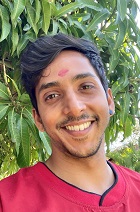Kershan Vikram Pancham
 Kershan Vikram Pancham is a PhD candidate at the African Studies Centre Leiden under the Leiden University-University of Edinburgh Partnership.
Kershan Vikram Pancham is a PhD candidate at the African Studies Centre Leiden under the Leiden University-University of Edinburgh Partnership.
Kershan is a public educator, researcher and artist dedicated to justice, rights, aesthetics and freedoms of everyday and ordinary people. Their research focuses on diversity and differences that matter in society, with a sensitivity to the body, dispossession, humiliation and agency, as they pertain to children, and LGBTQ peoples.
They are a Mandela Rhodes Scholar with an MPhil in Sociology (Diversity Studies) with distinction, University of Cape Town, 2017. Their thesis about child-parent narratives with Indian-Durban orientations was shortlisted for the Africa Thesis Award 2017 and was staged for the public through the ICA ProHelvetia Live Art Performance. Their undergraduate trainings include a BSc. in Computer Science cum laude from the University of KwaZulu-Natal, a BA. and BA. Honours in Film Writing and Directing from The South African School of Motion Picture Medium and Live Performance (AFDA). They have held scholarships and fellowships from the South African National Research Foundation, the Andrew W Mellon Foundation, the Institute for Creative Arts at the University of Cape Town, and the Mandela Rhodes Foundation.
They bring to their doctoral studies several years of teaching experience in African Studies, Gender Studies, Sociology and Anthropology at the University of Cape Town; research experience with the South African BRICS Think Tank and the Wits Centre for Critical Diversity Studies; and public leadership experience as the Ethics Coordinator for the Precolonial Catalytical Project of National Institute for the Humanities and Social Sciences in South Africa, based at the Centre for African Studies at the University of Cape Town. They have worked as an applied researcher with social, environmental, indigenous and LGBTQ-oriented political movements in South Africa, while also advising corporates and government sector bodies, in order to strengthen productive pathways between research, education, policy and publics.

